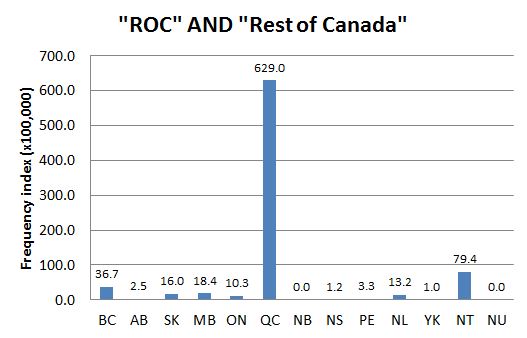DCHP-2
ROC Rest of Canada, rest of Canada DCHP-2 (October 2016)
n. — abbreviation, Quebec, Politics, French relations
Rest of Canada; the parts of Canada outside Quebec.
Type: 1. Origin — The term is most popular in Quebec (see Chart 1) and has undergone semantic specialization from the more general context that pits one location against the "rest of the country", a meaning that is found in Canada as well as Quebec. This special meaning is mostly used in political contexts and designates Quebec as a distinct entity within Canada, which reflects its special status in a number of ways. More problematically, the term also represents the non-Quebec part of Canada as a homogeneous entity, which it is not.
See also ITP Nelson, s.v. "ROC".See also: separation (meaning 1) Rest of Canada
- It appears that use of the abbreviation and term is is rarer in the 2010s than in the 1980s and 1990s. The intense political focus on Quebec during discussions around the patriation of the Constitution Act and the 1980 and 1995 referenda on Quebec sovereigny has dissipated in recent years.
References:
Images:
Chart 1: Regional Domain Search, 12 Apr. 2013
